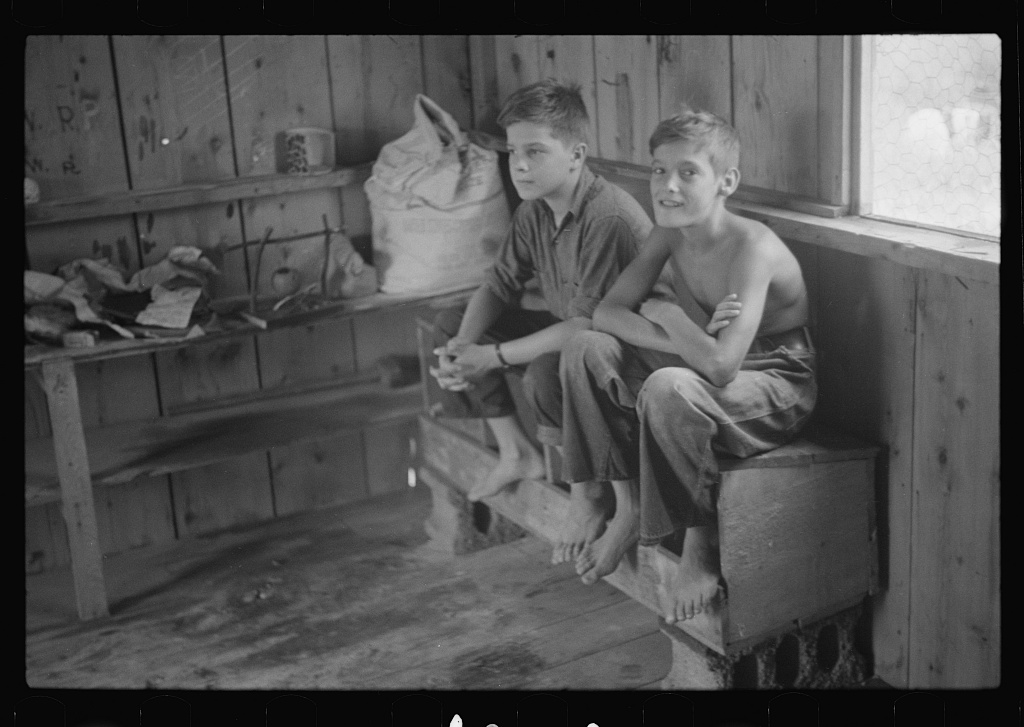Southern Legitimacy Statement: I was born and raised in a small community in Western North Carolina. I come from a long line of trade workers, musicians, and storytellers. The South is my home.
Gutted
The glow of the moon overhead lingers like a calling. I step into the cold, rod in hand, count the mailboxes along the roadside. Snow drops and lands on my shoulders, and I’m reminded of days when rain cut the sky open like a bare-bellied pig, pouring out its soul.
Mid-century houses line the roadside of Pinehurst Road, which isn’t but a mile long, and is split in half by train tracks. Some of the men in the neighborhood were tobacco farmers in their prime, some millworkers. Before my grandaddy died, he’d been among them as a mason. He built the house I sleep in from the ground up. Barehanded. Carved scripture into the concrete slab on which it sits.
The old folks around town don’t hardly talk to me when they see me, although I walk the streets often and catch their glares like flies on a car grille. The only person who even talks to me is Judd, and I figure it’s because he feels bad for me. Judd’s an old man. I mean, real old. Skin leathered, wrinkles deep as canyons. His wife died of a copperhead bite a few years back, got sick really bad. They didn’t even know she’d been bitten until the autopsy. How in the hell, you ask? She’d been popping pain pills for her arthritis. With shit that strong in her system, she wouldn’t have known what day it was, let alone felt any sort of bite.
Judd loved that woman. Still goes out there every morning and feeds the fish in their pond because of how happy it made her to see them swim. Ever since the snow started two weeks ago, I go out there at night to fish, and sometimes get lucky enough to return with dinner.
A big rock stretches over the water around the right edge of the pond. Solar lights ring the pond like a halo and illuminate ripples the brim stir. There is a fish the length of my hand that resides underneath that rock. When I step onto the surface, the fish bolts out from beneath me. I drop a hook and the hesitant creature creeps back into view. The fish kisses the corn with an urgent delicacy before pulling the bait into its stomach, only to spit it back out over and over again. I shake the hot hands in my pockets one hand at a time to warm my palms.
Around my third hour sitting outside Judd’s, I jerk the line, pulling the metal through the edge of a fish’s mouth. I tug its body out of the water in one swift motion as I dangle the fish in front of me. After grabbing its cold body from the air, I hold the fish still and pull the hook loose from its cheek as blood coats my fingers, my chapped skin with slime. The fish is cold and brown, the color of mud. Our breath is in-sync. The fish opens and closes its mouth to a manual routine. The oxygen I inhale fuels my body, keeps me alive, but every breath the fish takes out of water puts it a step closer to death.
My walk home isn’t more than a few houses down. By the time my feet touch the front porch, the poor thing has already stopped breathing. I scale its body on my kitchen counter, spiking the blade into its brain. I make a clean slice up the middle of its underbelly and spread its stomach open to reveal the pink pocket where the organs are tucked away. I jiggle the blade inside to loosen the innards. Then I turn the fish upside down and watch the pink clumps of flesh fall into the trashcan like candy out of a plastic pumpkin. In a cast iron skillet, I fry the plump fish up with butter and minced garlic, then devour it in seconds.
After a couple weeks of fishing Judd’s pond, there isn’t much anything left but water swamped with frosted algae. To my surprise, the water hadn’t frozen solid. As far as Judd was concerned, the fish evaporated into thin air.
“No bones or nothing,” the old man tells me one morning. Tears bring a fog to his eyes. His breath appears before him as clouds. He has his hand resting on the mailbox to hold himself up.
“Those were Martha’s fishies,” he says. “She’d go out there and toss pellets every morning before…”
His voice trails off. A tear trickles down his cheek. I feel bad. I feel gutted.
“But I reckon all good things die,” he says. “That I know for sure.”
The old man wipes his face with his glove and turns back towards his house. Smoke guzzles from the chimney. Even from a distance, I feel the warmth of his home in my belly.
Snow falls from the sky in pellets as I walk home. I step inside to find the smell of fish remnant on the stovetop, then glance at myself in the hall mirror. My eyes are worn and heavy, the skin beneath them sags. My brown hair is littered with snow, hardly melted. I reach up and touch my chapped lips. Their texture reminds me of fish scales. There is blood in the corners of my frown, and the thought of tasting that blood makes my stomach grumble.
***







